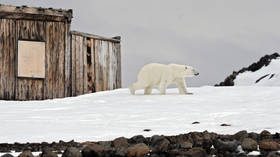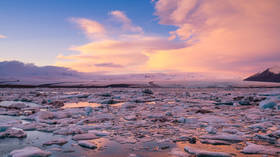Western sanctions destroying global warming research – NYT

Vital research into climate change has been stymied by Western sanctions against Russia, which holds crucial data about the Arctic, according to the New York Times.
American and European scientists studying the areas beyond the Arctic Circle were told to cease collaboration with their Russian counterparts following the escalation of the Ukraine conflict in February 2022 and the ensuing Western sanctions against Moscow, the outlet reported on Tuesday.
The move left Western scientists scrambling for crucial data, the NYT has reported, as Russia makes up over half of the Arctic in terms of coastline and land mass.
Monitoring the temperatures in region is central to climate change research and modelling, as the melting ice contributes to rising sea levels, and changing temperature and precipitation patterns.
“It may be impossible to understand how the Arctic is changing without Russia,” the newspaper quoted Italian permafrost scientist Alessandro Longhi as saying.
The exclusion of Russia means that “half of the Arctic climate dataset is currently missing,” according to the Danish Institute for International Studies.
Most EU and NATO members decided to suspend all research projects involving Russian institutions or taking place in Russia in the immediate aftermath of the Ukraine conflict.
Russian field stations were removed from the International Network for Terrestrial Research and Monitoring in the Arctic, a global network of 60 field stations in the northern latitudes. This led to a “marked” loss of data used to monitor changes in ecosystems, a study published in the British scientific journal Nature earlier this year noted.
Scientific ties in the Arctic are evolving, however, with new partnerships, namely with China and India, being fostered, the Russian Council on International Affairs said earlier this year.
According to a previous report in the Russian daily Nezavisimaya Gazeta, BRICS states and the Shanghai Cooperation Organization, as well as countries in Latin America, the Middle East, and Asia-Pacific region have expressed interest in the Arctic.
China and India have moved from being observers in the Arctic Council, an intergovernmental forum promoting cooperation among the Arctic states, to actively participating in Arctic research projects, the publication noted.













